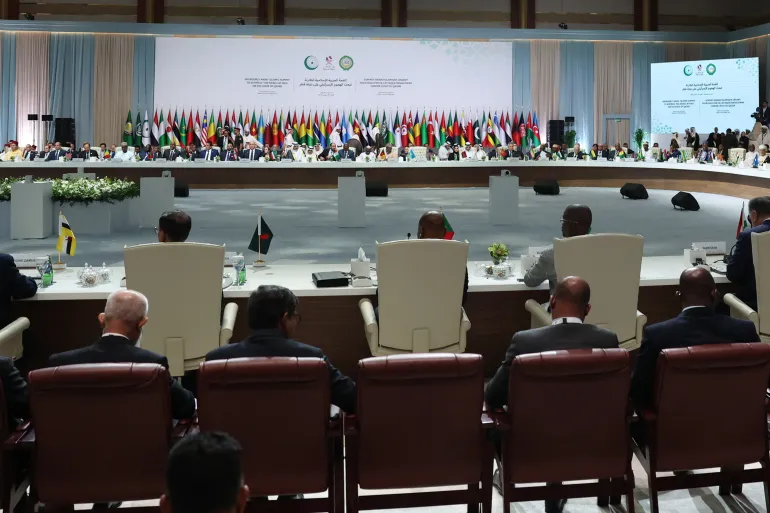By Bymohammed El,Mohammed El-Said
Copyright dailynewsegypt

The emergency Arab-Islamic summit held in Doha on Monday delivered a strong condemnation of the “cowardly and illegal Israeli attack on the state of Qatar,” underscoring the collective security and shared destiny of Arab and Islamic nations.
The summit’s final communiqué expressed “absolute solidarity with Qatar” and pledged support for the measures Doha takes in response to the assault, describing the attack as one that “undermines any chance of achieving peace in the region.” The statement highlighted that aggression against a neutral mediator not only threatens Qatar but also jeopardizes international peacemaking efforts. It praised Qatar’s “civilised and wise” handling of the incident and lauded its “constructive and appreciated” role in mediation and maintaining regional security.
Summit leaders emphasized that the strike was aimed at sabotaging ongoing mediation efforts to halt the conflict in Gaza, reaffirming their backing of Qatar, Egypt, and the United States as key mediators striving to end the war. In addition, the communiqué reaffirmed the principle of collective security and the common destiny shared by Arab and Islamic states.
Furthermore, the summit took a firm stance against Israeli plans to impose a new reality in the region, unequivocally rejecting Israel’s repeated threats to target Qatar again. The leaders categorically condemned any attempts to justify the aggression and reiterated their opposition to the displacement of Palestinians under any pretext.
During the summit, leaders denounced Israel’s strike on a residential compound in Doha that housed families and negotiators from Hamas. They described the attack as a blatant violation of international law and a dangerous escalation undermining mediation efforts to end the Gaza conflict. Many warned that the strike threatened the collective security of the Arab and Islamic world and called for a unified, decisive response.
Qatar’s Emir, Sheikh Tamim bin Hamad Al Thani, expressed shock at the “treacherous assault” on Doha, noting that Hamas’s leadership was reviewing a US proposal delivered through Qatar and Egypt at the time. He questioned the rationale behind the attack, asking, “If Israel wanted to assassinate Hamas leaders, why does it negotiate with them?” He accused Israel of deliberately sabotaging peace talks and characterized the Gaza war as “a war of extermination” aimed at making the enclave uninhabitable and displacing its population. Sheikh Tamim vowed that Qatar would do “whatever it takes to defend its sovereignty and confront Israeli aggression.”
Echoing this, Egyptian President Abdel Fattah Al-Sisi condemned the strike as “a grave violation of international law and a dangerous precedent.” He warned that Israel’s “unchecked behavior” risked widening the conflict and destabilizing the entire region. Al-Sisi stressed the urgent need for a collective stance rooted in shared principles to counter growing Israeli arrogance and impunity.
Turkish President Recep Tayyip Erdogan described Israel’s assault on Qatar—a key peace mediator—as “a direct threat to our region.” He called for Israeli officials to be held accountable before international courts and urged economic sanctions against Israel, citing “previous experience” that demonstrated their effectiveness. Erdogan also emphasized the need for closer cooperation among Muslim nations to confront this threat.
Jordan’s King Abdullah II declared, “Qatar’s security is our security, and its stability is our stability,” urging a firm and clear response to the attack. He warned that the strike exposed how “Israel’s threat knows no borders,” undermining hopes for a two-state solution.
Palestinian President Mahmoud Abbas stressed that an attack on any Arab or Muslim state “is an attack on us all.” He insisted that peace and stability depend on ending “the war of extermination, forced displacement, and land theft” and bringing an end to Israel’s occupation of Palestinian territories.
Iranian President Masoud Pezeshkian described the strike as “naked terrorism violating every international norm.” He accused Israel of attacking multiple Arab and Muslim states this year under the guise of self-defense, enabled by “Western cover” that allows it to act with impunity.
Syrian President Ahmad Al-Sharaa called the targeting of mediators “a rare occurrence in history” and reaffirmed support for Qatar against what he labeled “Israeli aggression.”
Lebanese President Joseph Aoun stated that the true target of the strike was the principle of mediation and dialogue. He urged Arab and Muslim leaders to present a unified front at the upcoming United Nations General Assembly.
Other leaders echoed concerns that the attack signals a broader regional threat. Kuwait’s Crown Prince Sheikh Sabah Khaled Al-Hamad Al-Sabah described the strike as “clear evidence of Israel’s intent to derail peace efforts,” while Iraq’s Prime Minister Mohammed Shia Al-Sudani called it “a deliberate killing of peace opportunities” and proposed forming a joint Arab-Islamic committee to bring the matter before the UN Security Council.
Mauritanian President Mohamed Ould Cheikh El Ghazouani condemned the assault as part of a “systematic pattern of aggression,” urging collective action. Somalia’s President Hassan Sheikh Mohamud expressed solidarity with Qatar and called on the UN Security Council to uphold its mandate to preserve international peace.
From outside the Middle East, Malaysian Prime Minister Anwar Ibrahim branded the strike “barbaric” and stressed that condemnation alone is insufficient, calling for sanctions and severing trade ties with Israel. Pakistan’s Prime Minister Shehbaz Sharif supported establishing an Arab-Islamic task force to take “effective measures” and advocated for Israel’s suspension from the United Nations.
The Organization of Islamic Cooperation (OIC) Secretary General Hissein Brahim Taha called for a “unified and resolute” response, while Algeria’s Foreign Minister Ahmed Attaf labeled the attack “an assault on the entire Muslim world.” Indonesia’s Foreign Minister Sugiuno also condemned the strike as a flagrant violation of international law that threatens Qatar’s mediation role.
The Gulf Cooperation Council (GCC) issued a statement condemning the assault in the “strongest terms,” describing it as a serious breach of international law. The GCC Defense Council announced plans to hold an urgent meeting in Doha to evaluate regional security and activate joint defense mechanisms.
The summit concluded with a broad consensus that the strike on Qatar was not an isolated incident but part of a deliberate strategy to undermine peace efforts. Leaders reaffirmed full support for Doha, demanded an end to the Gaza war, called for the prevention of Palestinian displacement, and urged coordinated political and economic pressure on Israel alongside intensified efforts in international forums.



